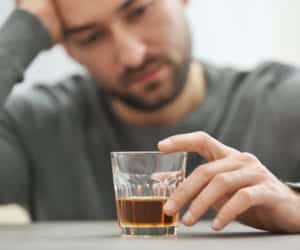Alcohol and Depression

The Causal Relationship Between the Two
There is a distinct and definite relationship between alcohol and depression; alcohol can cause one to become depressed while having depression can result in alcohol abuse. This vicious cycle requires professional treatment services in order to overcome. If you are struggling with alcohol abuse because of your depression or depression because of your alcohol abuse, you have what is called a co-occurring disorder. This type of disorder requires dual diagnosis treatment, in addition to subsequent therapy, in order to successfully overcome.
For those who struggle with depression, whether seasonal affective disorder, perinatal depression, disruptive mood depression, or psychotic depression, alcohol may seem like a solution and, therefore, becomes a coping mechanism. Alcohol releases temporary endorphins which make individuals happier. As the alcohol wears off, though, the depression creeps back in as the happiness dissipates. In turn, individuals may drink more in order to avoid the symptoms of depression; a very dangerous cycle of abuse. If depression is a result of drinking alcohol, these symptoms may go away if you stop drinking alcohol altogether. Oftentimes, this requires addiction treatment and therapy.
Does Alcohol Make Depression Worse?
The answer is yes, alcohol amplifies the symptoms of depression and makes it much worse. Alcohol affects the central nervous system which controls the activities of the body as well as brain activity. When the body is under the influence of alcohol, it cannot regulate and balance ‘mood’ which explains why people get agitated and pick fights when they have been drinking.
Depression can also hinder your ability to have a restful sleep and may result in a sleeping disorder. When you add alcohol into the mix, you are simply adding fuel to the fire. If you rely on alcohol as a coping mechanism for your depression, it’s important that you seek help now.
A common question is whether or not the alcohol-depression cycle goes away after a certain period of time. The answer is simply no and in fact, the situation with continue to worsen until you get help. Not getting the necessary help and continuing down this dangerous path will make your drinking worse and your depression worse. This progression of alcohol abuse and depression can have major impacts on your life and the life of your loved ones.
Treatment for Depression
There is treatment available for every degree of depression. The sooner you begin treatment, the sooner you can get back to a life that is not controlled or defined by your substance abuse. Some of the treatment options that may be available to you are:
-
- Medications such as antidepressants
-
- Psychotherapy such as cognitive behavioral therapy
- Brain stimulation therapy
There are many different types of alcohol addiction treatment programs that are available to assist you in overcoming your addiction. Some individuals are better candidates for inpatient treatment while others are better suited for outpatient treatment services. An addiciton care specialist will ensure that you get the proper treatment for your unique needs.
It’s vital that you get the help you need in order to get better as living with co-occurring disorders can make you feel as though you are stuck with no way out. The right combination of medication, therapy, counseling, and treatment can get you well on your way toward a sober future.
If you or a loved one needs help with abuse and/or treatment, please call the WhiteSands Treatment at (877) 855-3470. Our addiction specialists can assess your recovery needs and help you get the addiction treatment that provides the best chance for your long-term recovery.
